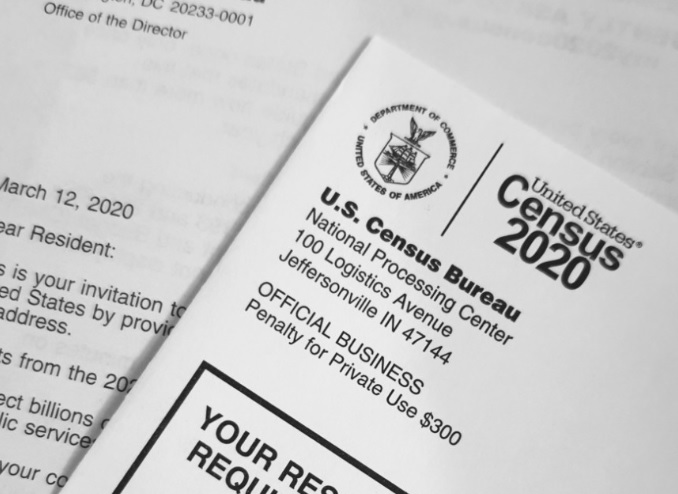
2020 Census mail (Photo by Enayet Raheem on Unsplash)
April 26, 2021 By Allie Griffin
It could have been a whole lot worse.
The U.S. Census Bureau announced today that New York State will be losing one seat in the House of Representatives.
The decline was less severe than many New Yorkers feared, with many expecting the state to lose two seats. The loss of a seat, however, is still a blow since it means one less vote in the House and a lost Electoral College vote in the presidential race.
Officials learned today that New York will have 26 House seats instead of 27, given its population size relative to other states. The distribution of the nation’s 435 seats in the House of Representatives—as well as the 538 Electoral College votes—is determined via the Census every 10 years.
Despite the loss of representation and political sway, New York City census officials called the announcement a victory of sorts.
“It is absolutely a win for New York because every prediction had us losing two [seats],” said Amit Bagga, the deputy director of the NYC 2020 census campaign and a candidate for City Council in Queens.
The state managed to avoid taking a hit, with the census count showing that the state’s overall population grew by about 4 percent from 19.4 million in 2010 to 20.2 million last year. Overall, the state’s population increased by 823,000 over the decade.
The state almost held onto all 27 House seats. It just needed 89 more people to keep them all, U.S. Census officials said today. Instead it was edged out by Minnesota, which held onto its current allocation of seats.
The results clearly defied the naysayers who said that New York would lose two seats.
Bagga, who’s running for the District 26 Council seat, said the loss of only one Congressional seat made clear how successful the city was in making sure everyone was counted.
“The NYC Census 2020 team and our 160-plus funded partners led New York City to a historic response rate, contributing to the overall state response rate [and that] is the reason behind this,” he said.
Bagga said the city invested $20 million directly into more than 160 community-based organizations that partnered with census workers to count people in communities historically undercounted.
The city had an impressive census self-response rate, Bagga said, despite a global pandemic and interference from the Trump administration.
New York City’s self-response rate — meaning those who filled out the Census either online or by phone without a prompt from a door-knock — was nearly 62 percent, according to census data.
“I’m proud to say that at least in New York City, we came out on top of almost every major city in the United States in terms of our self-response,” Bagga said.
The Big Apple had a higher response rate than several large cities such as Los Angeles, Chicago, Boston, Philadelphia, Baltimore, Detroit, Atlanta, Miami, Orlando, Houston, and Dallas, among others.
Nearly every majority Black neighborhood across the five boroughs outpaced its response rate compared to the 2010 census, Bagga added.

Amit Singh Bagga Photo: Amit For Council
“We are very proud of this work and we are very proud of the team that did the incredibly hard work in the middle of an unprecedented global pandemic,” he said. “Let us not forget the census [count] started on the day that New York City went into lock down, March 12.”
The state, despite the lost seat, will still have the fourth largest delegation in the House of Representatives behind California, Texas and Florida respectively.
States in the South and West are being apportioned with additional House seats given their blossoming population numbers. Meanwhile states in the Northeast and Midwest continue to lose seats — a trend that has remained steady since 1940, census officials said.
Texas gained two seats, while five other states gained a seat. Seven states, including New York and California, lost one seat.
The reallocation of seats also plays a role in the presidential election as it is a major factor in determining the number of Electoral College votes each state gets.
The 538 Electoral College votes equates to the distribution of the 435 House seats, plus each state gets an additional two votes (as in two senators per state, or 100 votes); and then there are three separate votes for the District of Columbia.
Across the nation, the population is growing—although at a much slower pace than in the past.
The U.S. census data determined a national population of 331 million last year, a 7.4 percent increase from the official 2010 census count. The growth rate was the second slowest in U.S. history, federal census officials said.
The data has yet to be broken down by counties, cities, towns and other smaller geographic areas. Federal officials said it would be released no later than Sept. 30.
This data will determine the redistricting of New York and other states and will guide where the one congressional seat will be lost within New York.
The results will also determine how much federal aid money each locality will receive to fund services such as schools, hospitals, transit, infrastructure and more.
“Every aspect of the lives that we lead as New Yorkers really is dependent on the census,” Bagga said.
“It underscores how valuable and critical it is that each and every single one of us — regardless of documentation status, what language we speak or the type of home we live in — participate in the census,” he added.
